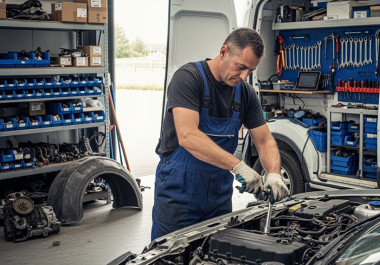The prospect of acquiring a car from an auction can be compelling, offering access to unique models and competitive pricing. When that vehicle is located overseas, however, the purchase is merely the first step in a multi-stage journey. Importing a car into the UK involves a structured process governed by strict rules and regulations that must be navigated with precision. The process requires careful planning, from initial budgeting and pre-purchase checks through to customs clearance, vehicle modifications, and final registration.
This guide breaks down the importation journey into distinct phases, providing a clear roadmap for potential buyers. Understanding these stages is key to a successful outcome. For those who prefer a more direct path to vehicle ownership, sourcing a car domestically through RAW2k offers a simpler alternative, bypassing international complexities entirely. For any questions about our UK-based auctions, our team is ready to assist via the RAW2k contact page.
Phase 1: Pre-Purchase Diligence and Financial Planning
Before placing a single bid, extensive preparation is essential. This initial phase is arguably the most critical, as it lays the foundation for the entire project and determines its viability. It involves creating a comprehensive budget and thoroughly researching the vehicle in the context of UK regulations.
Creating a Total Importation Budget
The final price you pay for an imported vehicle extends far beyond the auction's hammer price. A realistic budget must account for numerous additional expenses. These include:
-
Auction House Fees: A buyer’s premium is standard.
-
Shipping and Insurance: Costs to transport the vehicle from its current location to a UK port, including insurance to cover it during transit.
-
UK Import Duties and VAT: This is a substantial cost. A duty of around 10% is typically applied to the vehicle's value (including purchase price and shipping). Following that, a 20% VAT is levied on the total sum of the vehicle's value, shipping, and the import duty.
-
Modification and Testing Fees: A contingency fund for making the car compliant with UK standards is vital.
-
Registration and Tax: DVLA first registration fees and the initial road tax payment.
Failing to account for these significant costs at the outset can jeopardise the entire importation.
Vehicle Viability Research
Equally important is researching the specific vehicle's suitability for UK roads. The official car import regulations are complex, and not all vehicles can be easily or affordably modified to comply. Before bidding, you should investigate if the car has a European Certificate of Conformity (CoC), which simplifies the process. For vehicles from outside the EU, such as the US or Japan, you must anticipate the need for more extensive modifications. Researching common compliance issues for the specific model can save considerable time and expense later on.
Phase 2: The Acquisition and Documentation Trail
Once your research is complete and you successfully win a vehicle at auction, the focus immediately shifts to securing the asset and its essential paperwork. A clear and complete documentation trail is the backbone of a successful importation.
Securing Essential Paperwork
At the point of purchase, you must obtain a complete set of original documents. This paperwork will be required by shipping agents, customs officials, and the DVLA. The key documents are:
-
The Bill of Sale or Invoice: This must clearly state the purchase price.
-
Proof of Ownership: The vehicle’s title document or foreign registration certificate is non-negotiable.
-
Certificate of Conformity (CoC): If available, this document is invaluable for proving the vehicle meets EU standards.
Without these documents, the auction car import process can stall indefinitely.
Arranging Logistics
With the paperwork secured, you must arrange for the vehicle to be transported to the UK by a reputable international shipping company. Ensure the company has experience in vehicle transportation and that you have adequate insurance to cover any potential damage during the long journey.
Phase 3: The Importation Journey and UK Compliance
This phase covers the vehicle’s arrival in the UK and the critical steps required to get it cleared by customs and modified to meet domestic standards.
Navigating UK Customs
Upon arrival at a UK port, your vehicle must be declared to HM Revenue & Customs (HMRC). This involves submitting all the documentation gathered in Phase 2 and paying the calculated import duty and VAT. The vehicle will not be released until these financial obligations are met and customs officials are satisfied with the paperwork. Any discrepancies can lead to significant delays.
The Compliance Challenge: Meeting UK Road Standards
Once released from customs, the car cannot be driven on UK roads. It must first be made compliant with UK safety and environmental laws. This often requires physical modifications, which can include:
-
Headlight Adjustment: Headlamps on vehicles from right-hand traffic countries must be replaced or adjusted to avoid dazzling oncoming drivers.
-
Speedometer Conversion: The speedometer must display speed in miles per hour (mph).
-
Rear Fog Lights: A rear fog light must be fitted to the centre or right-hand side of the vehicle if not already present.
-
Emissions and Safety Testing: For most non-EU imports, the car will need to pass an Individual Vehicle Approval (IVA) test to confirm it meets the necessary standards.
Should a vehicle prove too difficult or costly to make compliant, it cannot be registered for UK road use. For vehicles already in the UK that are deemed unfit for purpose, our scrap my car service offers a straightforward, compliant disposal method.
Phase 4: Final Hurdles to UK Registration
The final phase involves getting the vehicle officially registered with the DVLA, allowing it to be legally driven on UK roads.
The DVLA Registration Process
Registering an imported vehicle requires submitting a comprehensive application to the DVLA. This includes providing the vehicle approval certificate (e.g., IVA test pass), evidence that customs duties have been paid, the foreign registration document, and a valid UK MOT certificate if the car is over three years old. You will need to complete the correct application form (V55/5 for used vehicles), pay the first registration fee, and pay the applicable road tax. Once the DVLA approves the application, you will be issued a V5C registration certificate (logbook) and a UK registration number.
Simplifying the Process: The Domestic Auction Alternative
The journey of importing a car is complex and laden with potential costs and administrative challenges. For many buyers, a far simpler and more predictable path to ownership is to source a vehicle that is already located and registered in the UK.
By focusing on domestic auctions, you eliminate the entire importation framework. There are no shipping arrangements, customs duties, compliance modifications, or complex DVLA import applications to worry about. The process is streamlined, transparent, and significantly faster.
At RAW2k, we offer an extensive and varied selection of UK-based vehicles through our daily vehicle auctions. From standard car auctions to more specialised listings, you can find a vehicle that meets your needs without the complexities of importation. For those looking to sell a vehicle within the UK, our auction my car service provides an efficient platform to reach a wide audience of potential buyers.
Conclusion
Successfully importing a car bought at auction is a meticulous process that demands rigorous planning and attention to detail at every phase. From initial financial forecasting and documentation management to navigating customs and vehicle compliance, each step is crucial. While the reward can be a unique vehicle, the complexity of the auction car import process is substantial. For a more straightforward and predictable experience, the wide array of UK-based vehicles available through domestic auctions offers a highly attractive alternative.
Explore the current listings in our vehicle auctions today to find a car that is ready for the road, without the need for a passport.




